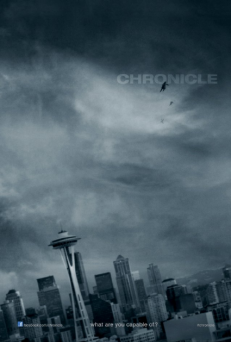By Jeremy Hannaford (Contributor) – Email
Print Edition: February 22, 2012
 Chronicle doesn’t just propose the question, “what you would do if you were given super powers,” but also asks “who would you become?” An interesting take on modern day super heroes, Chronicle shows that even with great powers, we all are still human. Whatever affected you before, whether it be harmful or not, will still affect you the same and even great power cannot overcome it.
Chronicle doesn’t just propose the question, “what you would do if you were given super powers,” but also asks “who would you become?” An interesting take on modern day super heroes, Chronicle shows that even with great powers, we all are still human. Whatever affected you before, whether it be harmful or not, will still affect you the same and even great power cannot overcome it.
While the whole found footage venue is becoming a recurring theme; that does not stop it from being creative. Director Josh Trank follows the action with not only one single camera but with multiple media sources dependant on the location of the scene such as other people’s cameras, phones and even security feeds. This helps build the film’s individuality as it does not concern itself with how the footage was found or documented, its primary focus is just to tell the story. There are moments in the film, however, where the camera’s placement is so still and well positioned, it verges on becoming a normal movie directive. These moments are very seldom but they run the risk breaking the norm.
The camera becomes more than just a tool to document the characters lives and powers. It at first acts as a means of defence against Andrew’s (Dane DeHaan) drunken father, but it becomes a personal link to how Andrew views himself. With the camera, he sees himself how he wants to be seen and revels in the fact that only he sees what he records. As he floats the camera around himself and his friends with his powers, it not only adds additional feeling and perspective, but it also proves how important it is to him. He holds it in his mind always and is never too rash or violent with it despite his other actions.
There are constant underlying vibes referring to comic book heroes and the rules of good and evil. The ideology of choosing sense over power is very evident as the three teenagers begin to understand their powers and what they can and can’t do. And with every story involving super powers, there is always the risk of being consumed by the power. Chronicle addresses this, but in a unique fashion. This film shows that one’s weaknesses cannot simply be overcome with strength, no matter what the strength may be. This is one of the key points in the script that is well-expressed. It also shows that despite a deep mind and extreme power, in distress one reverts to their simple self and feels “powerless.”
The performances by the main cast are realistic to the environment in which they are portrayed, even if they are a bit stereotypical. The popular class president and the reclusive loner with an abusive past feel familiar yet the third character, the deep thinker, adds interest to the trio as his powers help him see who he was and who he wants to be. He tries to better himself, but even with his new-found powers, is still afraid and uncertain at how to display a different side. While the ensuing events develop in a slightly predictable fashion, the cause-and-effect of the events is what truly develops the characters either into the better person or into the darker version of themselves.
With good performances, a creative script and a new take on found footage films, Chronicle plays out like a modern day retelling of troubled heroes like Spiderman or Anakin Skywalker, all the while producing a realistic environment in which teenagers deal with everyday problems like bullies, pure pressure and defining who you are.


